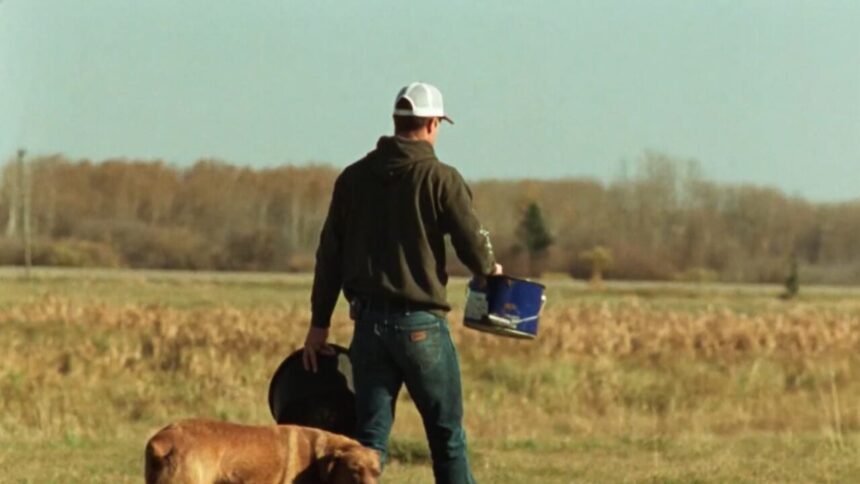As the sun rose over Lorne Valley in rural PEI last Tuesday, fifth-generation farmer Mark Jennings sat at his kitchen table, hands wrapped around a coffee mug, voice breaking slightly as he described the night he nearly ended his life three years ago.
“The bank was calling every day. We’d lost our dairy quota in the restructuring. My dad wasn’t speaking to me,” Jennings told me during a rare moment of candor that farmers seldom share publicly. “I walked out to the back field with my grandfather’s shotgun and stood there for almost an hour.”
This harrowing account opens CBC’s powerful new documentary “Breaking Ground: The Hidden Crisis in Canadian Agriculture,” which premieres nationwide next week. The 90-minute film follows four farming families across three provinces, revealing a mental health emergency largely invisible to urban Canadians who remain disconnected from the source of their food.
The statistics alone should alarm us. According to a 2021 University of Guelph study, 76% of Canadian farmers are experiencing moderate to high stress levels, with 58% meeting criteria for anxiety and 35% for depression – rates significantly higher than the general population. Perhaps most troubling, farmers die by suicide at rates 20-30% higher than non-agricultural workers, according to Health Canada data released last year.
“We’re losing the backbone of our food system to a preventable crisis,” explains Dr. Andria Jones-Bitton, the veterinarian and epidemiologist who led the Guelph research. “The combination of financial pressure, isolation, climate unpredictability, and the weight of generational expectations creates a perfect storm.”
The documentary explores how factors unique to agriculture intensify mental health challenges. Most farmers live where they work, making it nearly impossible to separate personal and professional stress. Many operate on razor-thin margins where a single season of drought or flood can end generations of family legacy.
When I visited the Matheson family’s century farm outside Regina, third-generation grain farmer Claire Matheson pointed to fields left fallow after consecutive drought years. “That’s $280,000 in seed, equipment payments, and operating costs with zero return,” she explained. “The bank doesn’t care that it didn’t rain. Neither does the equipment dealer or the fertilizer company.”
The film’s director, Sarah Hassan, spent eighteen months embedded with farming communities before filming began. “What surprised me most wasn’t just the stress itself, but how normalized suffering has become,” Hassan told me during post-production. “There’s this stoic culture of silence that prevents farmers from seeking help until they’re in crisis.”
This culture of silence extends beyond mental health. Many farmers described feeling increasingly misunderstood and vilified by urban consumers and policymakers. In Drumheller, Alberta, cattle rancher James Kilcoyne expressed frustration at being labeled an environmental villain despite implementing extensive sustainable practices.
“My family has been carbon sequestering for four generations – we just called it ‘good farming,'” Kilcoyne said, walking me through pastures where rotational grazing has increased soil organic matter by 4% over twenty years. “But you read social media, and suddenly we’re destroying the planet.”
The documentary doesn’t shy away from examining how agricultural policy decisions reverberate through rural communities. When the federal carbon pricing program increased fuel costs for essential farm operations, many producers faced difficult choices between modernizing equipment and meeting immediate expenses.
“Policy made in Ottawa often lacks on-the-ground understanding,” notes agricultural economist Jean-Philippe Gervais from Farm Credit Canada. “When farm equipment isn’t eligible for exemptions but needs to run regardless, that’s another $30,000 annual cost on operations already facing market volatility.”
The film captures a particularly tense town hall in Brandon, Manitoba, where federal representatives faced questions from frustrated producers about climate policies. One farmer stood up with utility bills in hand, asking pointedly: “Which part of my operation would you suggest I shut down first?”
What makes the documentary particularly valuable is how it balances these challenges with emerging solutions. In Quebec’s Eastern Townships, a farmer-led mental health initiative called “Cultivating Wellness” has trained over 100 “barn buddies” – fellow farmers who recognize warning signs and connect peers with professional support.
The program has arranged more than 450 confidential counseling sessions in its first two years, with participants reporting significant improvement in their mental well-being. Similar grassroots efforts have sprung up in Ontario and the Maritimes, though funding remains inconsistent.
“The problem isn’t awareness anymore – it’s access to services that understand agricultural realities,” explains Marcel Hacault from the Canadian Agricultural Safety Association. “A farmer can’t just take Wednesday afternoons off for therapy appointments during harvest season.”
The film highlights innovative approaches, like mobile mental health units that visit remote communities and telehealth services specifically designed for agricultural workers. Saskatchewan’s Farm Stress Line has expanded its hours to provide 24/7 support, though counselors admit their resources remain stretched thin.
For viewers, the documentary serves as both wake-up call and opportunity for connection. As Canadians increasingly question food security and supply chains, understanding the human cost of our agricultural system becomes essential.
“We’re not asking for pity,” Jennings told me as we concluded our interview. “We’re asking for partnership. Every Canadian interacts with farming three times a day when they eat. We just want them to remember there are real people behind that food – people who are struggling more than they should be.”
“Breaking Ground” debuts nationally on CBC and CBC Gem on November 14th at 9 p.m., followed by community screening events in rural communities throughout November and December.






